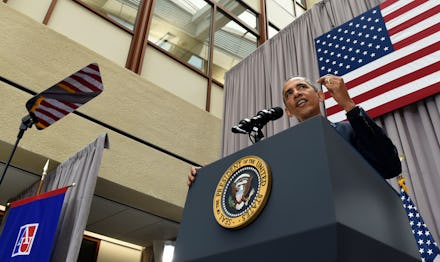President Obama Warns That Rejecting Iran Deal Would Put US on the Path to a New War

President Barack Obama challenged congressional Democrats to get on board with the Iran nuclear agreement Wednesday, arguing that a vote to scuttle the deal would put the United States on a path to war, while framing the ongoing political fight as "the most consequential foreign policy debate our country has had since the invasion of Iraq."
In a speech at American University in Washington, Obama alternated between explaining the contours of the controversial pact, which would check Tehran's nuclear ambitions for at least 15 years, and emphasizing that opposition to the accord is, in effect, an "argument against any diplomatic resolution to this problem."
Obama also launched a stinging salvo against his most vocal opponents on Capitol Hill, saying hardliners in Iran are "making common cause" with the Republican caucus, a suggestion that both groups profit politically by overstating and prolonging the conflict.
But this speech, more than any recent comments from the administration, represented a direct appeal to Democrats haunted by their own role in voting to grant former President George W. Bush the authority to use military force in Iraq.
"Between now and the congressional vote in September, you are going to hear a lot of arguments against this deal, backed by tens of millions of dollars in advertising," Obama said. "If the rhetoric in these ads and the accompanying commentary sounds familiar, it should. For many of the same people who argued for the war in Iraq are now making the case against the Iran nuclear deal."
Hillary Clinton, who helped open up negotiations with Iran and has expressed support for this seven-nation deal, saw her 2008 presidential campaign sunk partly as a result of her vote, as a senator in 2002, to clear the way for a U.S. invasion of Iraq.
Making the case: On Tuesday, Obama met with a group of Jewish leaders in the White House, his latest effort to blunt the impact of the multimillion-dollar lobbying effort against the deal. According to Politico, The American Israel Public Affairs Committee has already spent $11 million on television ads in 23 states, including New York and Florida, as part of wide-ranging attempt to undermine public support and amp up pressure on Congress.
One attendee, speaking anonymously because the meeting was meant to be private, told the Washington Post Obama "essentially said this would not be as big an issue and as big a fight if basically the pro-Israel community was not making it into a big fight."
Advantage Obama: But there is little indication, more than halfway through a 60-day "review period" set to expire on Sept. 17, that opponents of the deal will have enough votes in Congress to sink the deal. For all the recent rhetoric, the real drama begins when the Republican-controlled House and Senate pass a resolution opposing the agreement. That is expected to happen almost immediately after Congress returns from its late summer recess.
Obama has already promised to reject "any legislation that prevents the successful implementation of this deal," meaning both chambers would need two-thirds majorities to override his veto and blow up the deal.
The White House is, to this point, confident congressional allies will provide the necessary votes to sustain the president's veto. On Tuesday, Sens. Tim Kaine (D-Va.), Barbara Boxer (D-Calif.) and Bill Nelson (D-Fla.) all publicly announced they would back the deal. New York's Chuck Schumer, who is likely to become the party's next leader in the Senate, remains on the fence.
In the House of Representatives, Democratic Minority Leader Nancy Pelosi (Calif.) has declared her firm support, calling the accord a "diplomatic masterpiece." Another top California Democrat, Rep. Adam Schiff, the ranking member on the House Intelligence Committee, told the Atlantic on Monday he too was onboard.
"At the end of the day, I could not find an alternative that would turn out in a better way than the deal," Schiff said. "The risks associated with rejection of the deal are quite a bit higher than the risks associated with going forward."
Or else: If members of Congress are beginning to come around, the American public is not. According to a Quinnipiac poll released Monday, voters disapprove of the deal deal by a 2-to-1 margin, with 57% opposing the pact. Only 3 in 10 believe it will bolster U.S. security.
On Wednesday, Obama again argued that there was no more appealing alternative, no — as so many critics argue — potential to further grind down the Iranians with stricter new sanctions.
"Walk away from this deal," the president said, "and you will get a better deal — for Iran."
Watch the president's entire speech below: